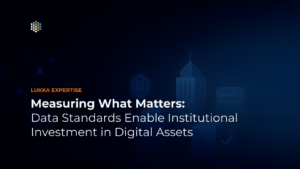Bitcoin is quickly approaching $750,000,000 in total venture capital investment. The majority of these investment dollars have been aggregated in just the past two and a half years, making it one of the leading investment vehicles in terms of emerging technology. Many analysts often compare the investment trend in Bitcoin companies with trends seen in companies at the beginning of the Internet itself and conjecture that both technologies are equally as groundbreaking. Really? Why?
First, let’s take a step outside — on to the street. Most people there when asked about Bitcoin associate it with its meteoric rise in price (it went from just under $50 to over $1000 — the cost of one bitcoin in one year’s time). Many also mention subsequent security and/or criminal issues involving Bitcoin (e.g. Mt. Gox, Silk Road) and price declines that followed. In fact, as of this post, one bitcoin is now only worth approximately $285 — several magnitudes lower than the highs that were recorded in the past.
So why does venture capital investment keep pouring into the technology despite the price decline?
Well, let’s talk about Greece. Virtually all of us who follow any news have heard about the condition of the Greek financial system. To sum it up in a nutshell, the subprime mortgage crisis in 2008 triggered a global financial crisis. Just as financial institutions here in the United States were bailed out, as were others in Europe. In Greece, specifically, the conditions became much worse. So bad, that Greece has needed several bailouts from financial syndicates in the European Union to get back on its feet… as we know, unfortunately, their problems continue and additional bailouts continue to be needed.
Now, let’s talk about China. Around 2010, China started loosening restrictions regarding how money could be invested in its stock market. In particular, regulators started becoming more lenient about people investing in the market with borrowed money. This led to a large influx of investment into the market. This worked fine until information began to seep out about the quality of investments, potential solvency issues, and the threat of an economic downturn. In just the past month and a half, China’s Shanghai Composite index — their benchmark index — went down approximately 38%. Approximately 4 trillion dollars has evaporated out of their market in that time. They are now experiencing a financial crisis.
So what does China’s and Greece’s market teach us?
Borrowed money. Performance issues. Solvency threats. Lack of financial transparency on the quality of assets. Government intervention. When history repeats itself, do we notice? Financial crises, near and far, whether in Greece or China, here at home or anywhere have one problem in common. Accounting.
And with that word, we’re finally ready to talk some more about Bitcoin. The price of one bitcoin going up or down, is not what venture capitalists are investing $750,000,000 dollars in. It’s because Bitcoin is Earth’s first step toward a globally automated, event-driven triple-entry ledger. A transaction on it can be anything — a cup of coffee, the sale of a stock, an automatic disbursement of a retirement check. An insurance reimbursement. It can also contain more abstract transactions, like a voting record or the issuance of a passport or driver’s license. Anything. All of which is accessible on-demand in a huge ledger-like, open data feed called the blockchain.
Bitcoin is algorithmic, meaning that any type of logic-driven event can be programmed to happen seamlessly when a condition or number of conditions are met. It updates in real-time, with both computer-generated transactions and human-generated transactions. All of the transactions happen in one place, making it a function very closely to that of a triple-entry ledger. Also, once a transaction has been confirmed and added it cannot be removed or changed.
This is where China and Greece come back in. A lack of a triple entry ledger creates opaque financial systems in our modern world. Furthermore, the lack of a distributed ledger shared by multiple parties, leads to inconsistencies in financial statements, increased subjectivity and macro-economic problems over time when scaled.
Unfortunately for many people inside Greece in recent weeks, it’s been quite difficult to utilize and/or acquire Bitcoin to take advantage of its perks. In other words — too little, too late. It’s been almost impossible for a person to exchange into it to circumvent capital controls and/or austerity measures. This is because of the great lengths the Greek government has gone to limit withdrawals from bank accounts. In fact, it’s gone as far as to cause companies like PayPal to almost completely shut off service in Greece for a period of time. Wallets couldn’t be funded from Greek bank accounts, nor could any existing balances be transferred outside of the country to other individuals. Actions like these subsequently make it nearly impossible to utilize Bitcoin exchanges. That said, Coinbase still noted in the past month that in Europe, Bitcoin buys had increased 300%, and Bitstamp, a leading European exchange based in London, noted a 350% increase in signups originating from Greece in the same period.
China, on the other hand, is a different story. Bitcoin adoption is booming there and only continues to increase and rapidly grow as a result of the recent chaotic events in their markets. Just earlier this Spring, Goldman Sachs noted in their data that up to 80% of Bitcoin’s daily trading volume originates from the Chinese Yuan, thus making China the largest market maker in the technology’s ecosystem by a long shot. This has proven even more-so true just in the past couple of weeks. For example, on July 27th, as the Shanghai Composite Index fell 8.5%, Bitcoin rose roughly 6.5% over the course of the same period. It is widely believed that due to the significant liquidity China already provides to the Bitcoin market on an average trading day, that this inverse relationship was very likely investor flight from the Shanghai Composite Index into a “safer” asset as it fell.
As the turbulent economic headwinds of this Summer show little sign of waning anytime soon, Bitcoin will no doubt continue to be in the news. Problems that have plagued economies, such as lack of transparency surrounding poorly performing assets, will continue to draw attention to new technologies that provide a shared ledger for multiple parties to invest, exchange and transact globally with confidence and trust. For Bitcoin, it will continue to be seen as a validation of its potential to improve beleaguered markets and protect the well-being of the global financial infrastructure it aims to serve.



